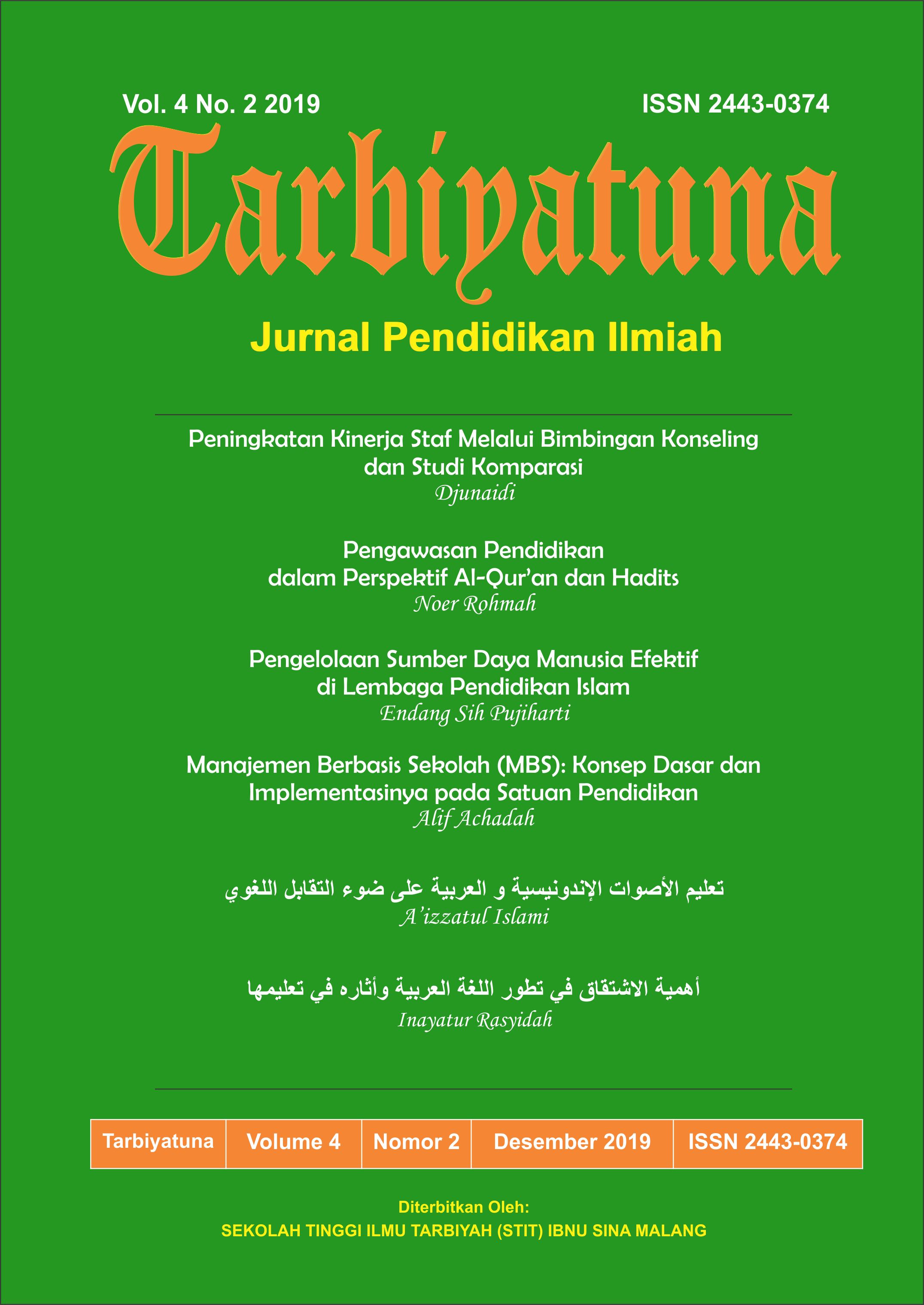Peningkatan Kinerja Staf Melalui Bimbingan Konseling dan Studi Komparasi
Abstract
Digitization era is a challenge and reality that must be faced and can not be avoided. Technology demand lead to increasingly fierce competition, so every organization needs Human Resources (HR) who have competence in order to work in providing excellent and satisfying services. Likewise in the world of education, the role of individual performance is needed to advance the quality of education. Without good performance, the goal will be very difficult to achieve. Thus, the performance of individual teachers is needed in the world of education. The performance of education is determined by the performance of the teachers. To improve teacher performance can be done in many ways including guidance counseling and comparative studies. Guidance counseling is a process of assistance provided by the mentor to individuals through face-to-face meetings or reciprocal relationships between the two. The goal is that the counselee has the ability to see and find the problems, then be able to solve it independently. Also expected to produce human resources or employees who have faith and piety, have a solid understanding and self-awareness basis, devote themselves professionally on the basis of the norms of his profession. Comparative Study is a learning concept carried out in different locations and environments which is an activity commonly carried out for the purpose of improving quality, expanding business, improving systems, determining new policies, improving legislation, and others.
References
Attwood, Margaret dan Stuart Dimmock. (1999). Manajemen Personalia. Bandung: ITB.
Bahri, Syaiful Djamarah dan Aswan Zain. (2002). Strategi Belajar Mengajar. Jakarta: PT Rineka Cipta.
Darma, Surya. (2005). Manajemen Kinerja; Falsafah Teori dan Penerapannya. Yogyakarta: Pustaka Pelajar.
Dewa Kettut Sukardi dan Desak P.E. Nila Kusmawati. (2008). Proses Bimbingan dan Konseling di Sekolah. Jakarta: PT. Rineka Cipta.
Hikmawati, Fenti. (2011). Bimbingan Konseling. Jakarta: PT. Rajagravindo Persada.
Makmur, Jamal Asmani. (2010). Panduan Efektif Bimbingan dan Konseling di Sekolah. Yogyakarta: Diva Press.
Moh. Surya. (1988). Dasar-dasar Konseling Pendidikan (Teori & Praktek). Yogyakarta: Kota Kembang.
Natawijaja, Rochman, (1987). Pendekatan-pendekatan dalam Penyuluhan Kelompok I. Bandung: Diponegoro.
Nurhayati, Eti. (2011). Bimbingan, Konseling & Psikoterapi Inovatif. Yogyakarta: Pustaka Pelajar.
Prayitno dan Erman Amti. (2004). Dasar-dasar Bimbingan dan Konseling. Jakarta: Rineka Cipta.
Sopiah. (2008). Perilaku Organisasional. Yogyakarta: C.V. Andi Offset.
Thoha, Miftah. (2007). Perilaku Organisasi Konsep Dasar dan Aplikasinya. Jakarta: PT. Rajagrafindo Persada.
Tohirin. (2007). Bimbingan dan Konseling di Sekolah dan Madrasah (Berbasis Integrasi). Jakarta: PT RajaGrafindo Persada.
Triton PB. (2009). Mengelola Sumber Daya Manusia; Kinerja, Motivasi, Kepuasan Kerja dan Produktivitas. Yogyakarta: Oriza.
Usman, Husaini. (2010). Manajemen; Teori, Praktik, dan Riset Pendidikan. Jakarta: Bumi Aksara.
Wahjosumidjo. (2001). Kepemimpinan dan Motivasi. Jakarta: Ghalia Indonesia.
Willis, Sofyan S., (2007). Konseling Individual Teori dan Praktik. Bandung: Alfabeta.

